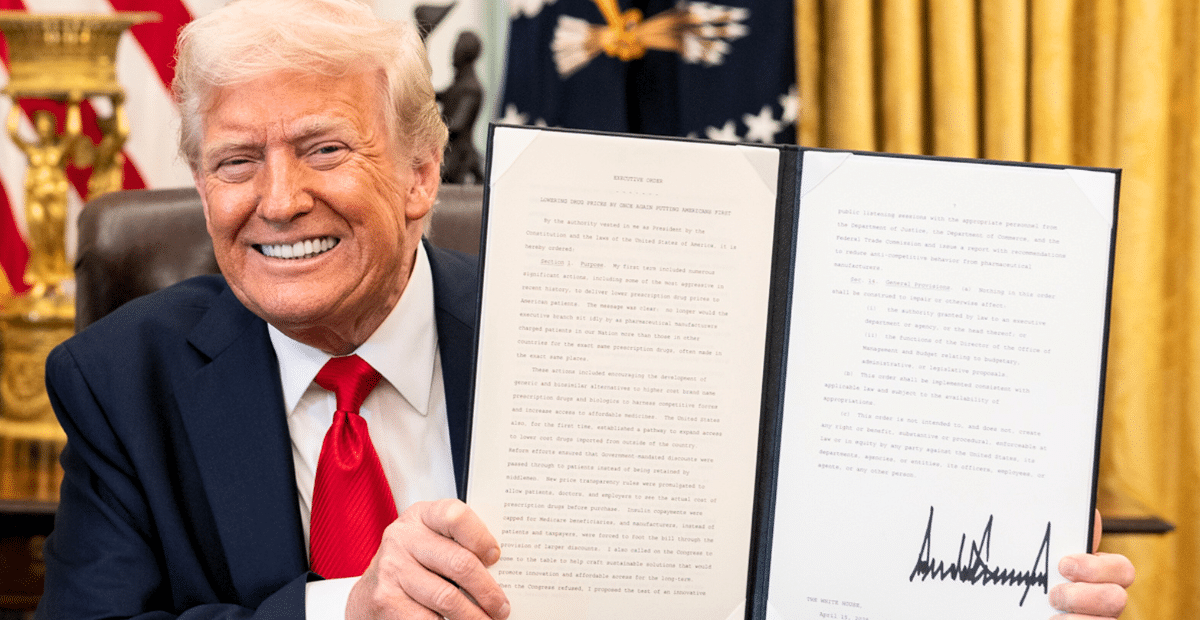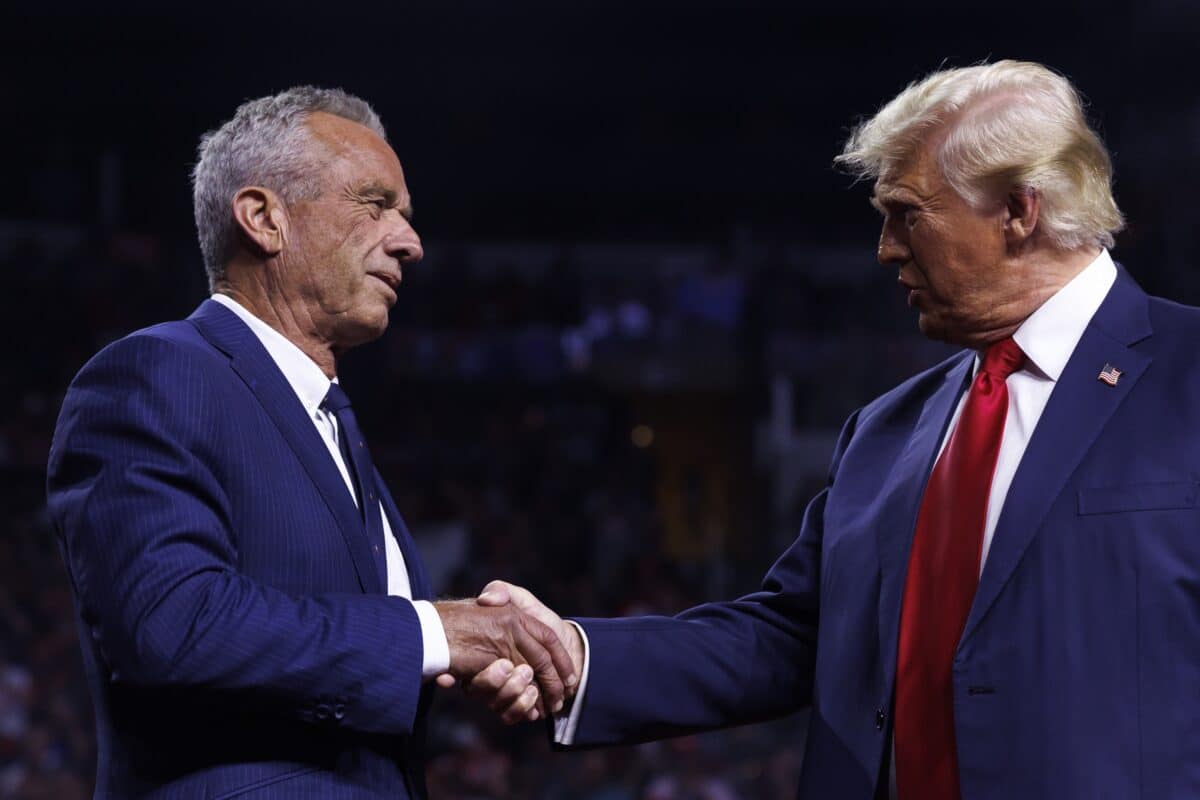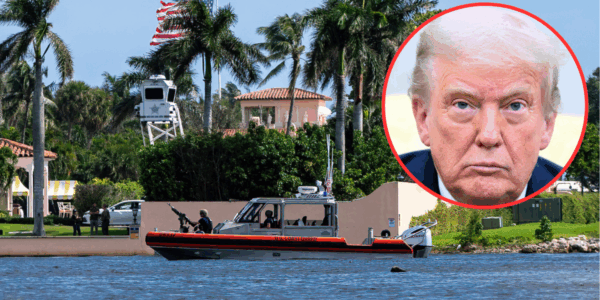Trump Celebrates 100 Days In Office: 5 Biggest Takeaways
on Apr 29, 2025

“America First” Policies Shine In Trump’s 1st 100 Days
What a difference 100 days make.
On January 20, President Donald Trump was sworn in as the 47th president, having previously served as the 45th president.
Now, on April 29, the Trump administration has been in office for 100 days, following the peaceful transfer of power from President Joe Biden.
Coinciding with Republican majorities in both the House of Representatives and the Senate, Trump is seen as having a mandate, comparable to the start of his first term in 2017.
This time, however, Trump has political experience, and he’s learned from his past entanglements with “the swamp.”
At the first White House Press Briefing, on January 29, Press Secretary Karoline Leavitt told reporters, “I think you can all expect … for him to continue to work at this breakneck speed.”
That “breakneck speed” has been maintained, and the confirmations of Trump’s cabinet picks have furthered the administration’s ability to take action on campaign promises.
Illegal Immigration
The first executive order Trump signed in his second term was the Laken Riley Act, named after the 22-year-old student who was murdered by an illegal migrant from Venezuela.
This was followed that day by Trump declaring a national emergency at the nation’s southern border.
Tom Homan, “border czar” and director of Enforcement and Removal Operations, told the press at a White House Press Briefing on April 28, “You can’t have national security if you don’t have strong border security.”
Continuing, Homan, who has been in immigration law enforcement since 1984, said:
“Even President Obama and President Clinton took some steps to secure the border because they understood national security was important. Joe Biden was the first president in the history of this nation who came into office and unsecured a border on purpose — that’s just a fact!”
Offering a report on border crossings since January 20, Homan said, “As I am standing here [on April 28], we are the most secure border in the history of this nation.”
Homan went on to note that sexual assault against women who cross the southern border illegally with the help of drug cartels was up 600% under Biden’s leadership, adding:
“When President Trump has the illegal immigration down 96% — when 96% less people are coming — how many women aren’t being sexually assaulted by the cartels? How many children aren’t dying making that journey? How many women and children aren’t being sex trafficked into this nation? How many known suspected terrorists aren’t making it into this country? How many pounds of fentanyl isn’t getting into this country to kill young Americans?”
From January 20, 2024, to April 1, 2024, Homan said there were 184,000 illegal migrants released into the United States. In that same period of time, but under Trump’s leadership, Homan said there were only nine who were released into the country.
“This is unprecedented success,” Homan said. “The border is secure. President Trump is saving lives … No one does it better than President Trump.”
Watch the April 28 press conference here:
Ban Of Artificial Food Dyes
In 2024, current Health and Human Services Secretary Robert F. Kennedy Jr. was running for president, first as a Democratic challenger to Biden, and later as an Independent.
He ran, primarily, on making America healthy, with a special emphasis on tackling the chronic childhood disease epidemic in the country.
When he failed to qualify for the first presidential debate, RFK Jr. eventually endorsed Trump for president, bringing about the Make America Healthy Again movement.

Make America Healthy Again: On August 23, 2024, Robert F. Kennedy Jr. announced the suspension of his presidential campaign and endorsed President Donald Trump. (Photo credit: Tom Brenner / The Washington Post / Getty Images)
While he may not have made it to the Oval Office, his confirmation as the head of HHS has begun proving fruitful.
In April, two of RFK Jr.’s presidential goals were addressed in a significant way.
First, the cause of the rising prevalence of autism, as indicated by the most recent CDC study, is going to be investigated. Second, the FDA, NIH, and HHS are working together to roll out a ban of petroleum-based artificial dyes in the country’s food and drug supply.
DOGE
Announced one week after his 2024 election victory, Trump established the Department of Government Efficiency, more commonly referred to as DOGE.
Helmed by tech entrepreneur Elon Musk, Trump announced on November 12, 2024, that DOGE’s goal was to “drive out the massive waste and fraud” found in the United States’ annual government spending, which amounts to $6.5 trillion.
Trump added, “They will work together to liberate our Economy, and make the U.S. Government accountable to ‘WE THE PEOPLE.’ Their work will conclude no later than July 4, 2026 – A smaller Government, with more efficiency and less bureaucracy, will be the perfect gift to America on the 250th Anniversary of The Declaration of Independence.”
Since then, Musk and the DOGE effort has been the subject of criticism from politicians, the press, and some citizens.
Regardless, as of April 20, DOGE reports on its website that it has saved an estimated $160 billion, which roughly translates to saving each taxpaying American $993.79.
Transparency
DOGE is not the only area of the Trump administration seeking to bring about transparency.
According to the National Journal, Trump took 1,009 questions from the press in his first month in office. In the same span of time, Biden only answered 141 questions.
That is a simple form of transparency, with the Trump administration often boasting of the access the press is granted to the president and his cabinet.
Similarly, this transparency has gone in the other direction, with the White House inviting reporters and publications of “new-media” to cover the administration.
Following the two assassination attempts made against him while on the campaign trail in 2024, Trump’s friendship with RFK Jr. lead to a promise to release all of the files pertaining to the assassinations of President John F. Kennedy and Senator Robert F. Kennedy.
This promise was fulfilled on March 18, with the JFK files; and on April 18, with the RFK files.
Further, files on the assassination of Civil Rights leader Martin Luther King Jr. are still anticipated, as well as files pertaining to the abuses of Jeffrey Epstein.
There’s also another facet to transparency, one which has more to do with motivations than specific actions.
Leading up to Easter, Trump renewed a promise to “defend the Christian faith” in his Palm Sunday presidential message, saying:
“This Holy Week, my Administration renews its promise to defend the Christian faith in our schools, military, workplaces, hospitals, and halls of government. We will never waver in safeguarding the right to religious liberty, upholding the dignity of life, and protecting God in our public square.”
This is bolstered by his establishing of the White House Faith Office, despite the controversial selection of Paula White-Cain to serve as senior faith advisor to the White House.
Tariffs
It has been an on-again, off-again relationship, with pauses and doubling downs between, but tariffs have been a significant part of the first 100 days of the Trump administration.
Ideally, Trump sees tariffs as a way to begin paying off the national debt and eventually countering inflation.
On April 2, Trump held a Liberation Day press event at the White House, signing an executive order to regulate imports with “a reciprocal tariff” in an effort to “rectify trade practices that contribute to large and persistent annual United States goods trade deficits.”
In the executive order, Trump noted he had signed two presidential memorandums to “investigate the causes” of the trade deficit experienced by the United States.
“On April 1, 2025, I received the final results of those investigations, and I am taking action today based on those results,” he said.
Trump’s goal is to Make America Wealthy Again, and, at the Liberation Day press event, he said, “We will supercharge our domestic industrial base, we will pry open foreign markets and break down foreign trade barriers, and, ultimately, more production at home will mean stronger competition and lower prices for consumers.”
Tariffs as high as 125% were levied against China, with Trump using the International Emergency Economic Powers Act to place a 10% tariff on all imported goods.
The stock market dropped following the Liberation Day announcement, but Trump had previously addressed this in his March 4 joint address to Congress, saying farmers and other industries would “probably have to bear with [him].”
The notion of bearing with him was communicated again on Truth Social on April 7, when Trump posted:
“The United States has a chance to do something that should have been done DECADES AGO. Don’t be Weak! Don’t be Stupid! Don’t be a PANICAN (A new party based on Weak and Stupid people!). Be Strong, Courageous, and Patient, and GREATNESS will be the result!”
By April 9, Trump announced a 90-day pause on all reciprocal tariffs.
How his administration will move forward with tariffs is yet to be seen.
Beyond tariffs, there are still other campaign promises which are still in the process of being addressed, including the negotiation of resolutions to the ongoing wars in Ukraine and Gaza.












